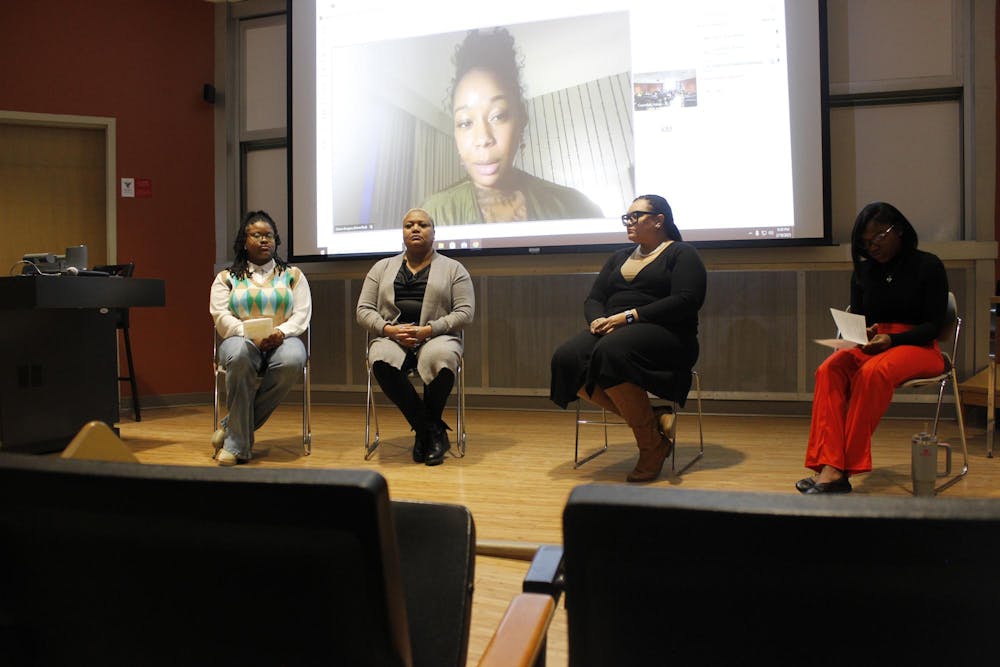Ball State welcomed three alumna cardinals back to the nest Feb. 18 for a panel empowering Black women in the business field at the university’s Teachers College room 120 to honor Black History Month.
The panel, “Herstory in the Making,” was student-led by fourth-year KwaTashea “Tash” Marfo and organized by Ball State’s Success in Sisterhood. The organization is an on-campus organization under the campus’ multicultural center, a hub dedicated to“help[ing] students of color on campus and educat[ing] the campus community about diversity,” according to its website.
The building has been Ball State’s “cornerstone of inclusiveness” since its 1968 construction, according to a Dec. 2024 press release from the university.
The event welcomed Mirror Indy Editor in Chief Oseye Boyd, Indianapolis Neighborhood Housing Partnership Director of Community Relations Kelly Doucet and Data Services Consultant Zakara Durkins to share anecdotal experiences of navigating today’s cultural landscape, according to the event’s flyer, through a series of student-promoted questions, all with the hopes to instill confidence within the next generation of Black women in the workforce.
Upon returning to their alma mater, the women were each asked to reflect on how their time at the university shaped their present-day careers.
“My life is basically a replica of what I did at Ball State, which was too much,” Doucet said. “I was in a lot of clubs and organizations and school — ironically enough — was not [the] number one [priority] for me.”
Boyd graduated with a different experience.
“I wish I would have been more social, because I was very focused on getting my degree,” she said. “Once you think you have it figured out, something else happens in your life. It’s a constant, continuum [of] figuring out how to do life — always. You shouldn't feel pressure if you don't have it quite figured out just yet.”

Fourth-year Ball State student KwaTashea "Tash" Marfo and Mirror Indy Editor in Chief Oseye Boyd discuss how Boyd's time at Ball State shaped her present-day career trajectory as a "focused person." The discussion was part of a Feb. 18 "Herstory in the Making" panel in Ball State's Teachers College, room 120. Katherine Hill, DN
Despite a difference of perspective, both women agreed the university was an epicenter for leadership opportunities and community building that they carry with them in their current job titles.
Differing perspectives are what the panelists centralized their discussion around, emphasizing the importance of representation vitality of individualism in a workplace setting.
“Perspectives are important because everybody has a different experience,” Doucet said. “People’s experiences shape their thoughts — and the goal is not to necessarily always change their mind,” she added, alluding to the polarizing political climate.
Closing in a political angle, the crux of the panel revealed itself as the topic of diversity, equity and inclusion came about, amid recent national legislation.
Jan. 31, less than two weeks after President Trump’s inauguration, he signed an executive order terminating diversity, equity and inclusion (DEI) initiatives in the federal government, according to the Associated Press (AP), in what he described in his inauguration speech as a move to end efforts to “socially engineer race and gender into every aspect of public and private life.”
The termination of DEI initiatives came just ahead of Febraury’s Black History Month. Feb. 18, the Education Dept. allowed schools two weeks to end race-based programs, in a statement that follows recent executive orders in which Trump made a promise to "close in " on the department, according to AP.
RELATED: Education Dept. allowing two weeks for schools to end race-based programs
“Black History Month this year is probably a lot deeper for me than it has been,” Doucet said. “There's a lot happening, and it's designed that way. The chaos is designed to be chaotic,” she warned.
To cope, Doucet said she has found refuge in cultural movies like “The Butler” and “Rusting” because “it is a constant reminder of what we have been fighting for, and that fight is still not over — but more importantly — how do we do it again? What does that mean in 2025 as opposed to 1960?” She asked.
Unity is the only surefire way to fight with purpose, Doucet said. “If we move together, that is impact,” she said. “Find that fight in you.”
A plausible answer, Doucet said, was to ask people about diversity, equity and inclusion as individual terms, rather than a “buzz word” acronym. “It holds people accountable,” she said.
Such accountability reminds people, “Black history is American history,” Boyd said.
Contact Katherine Hill with comments via email at katherine.hill@bsu.edu.





